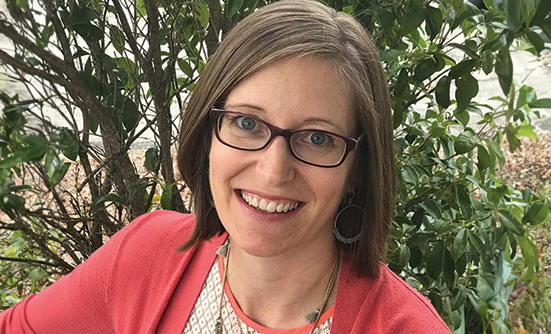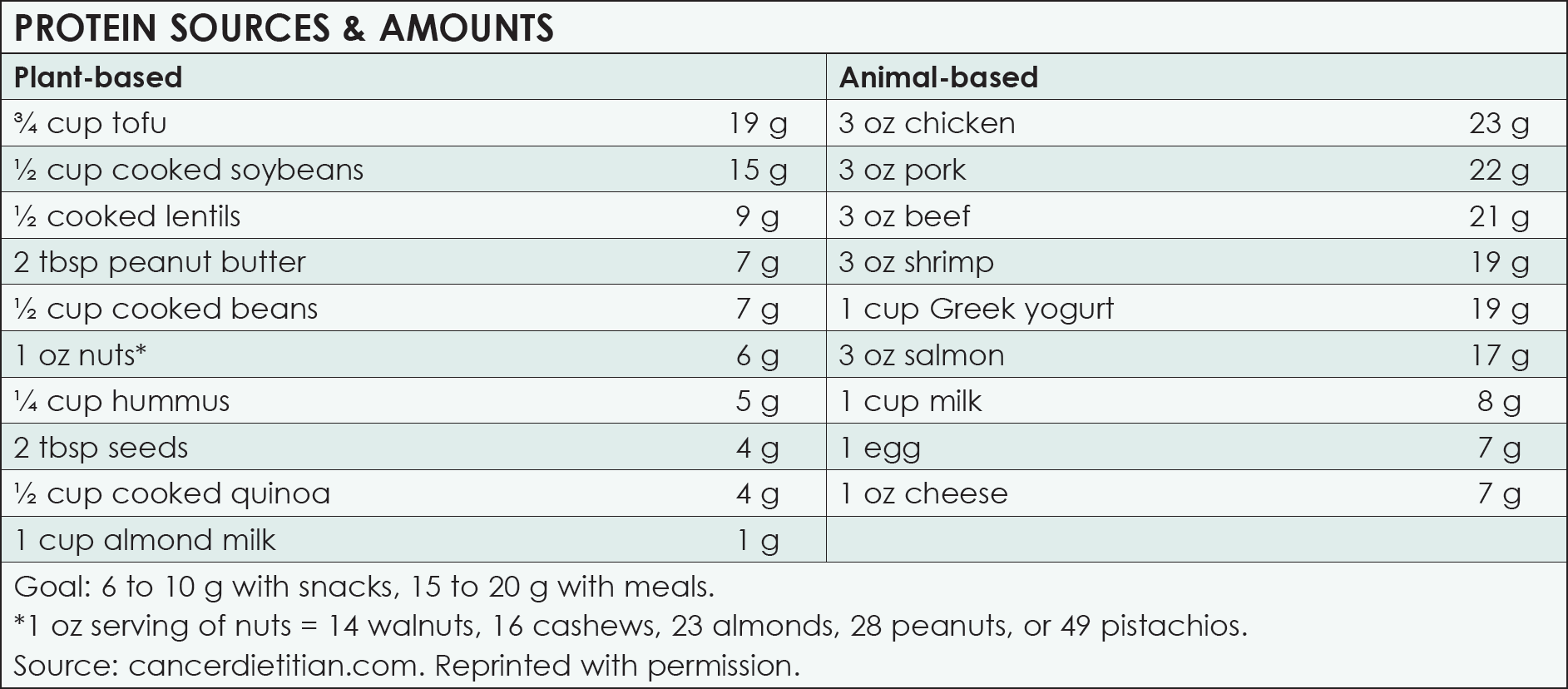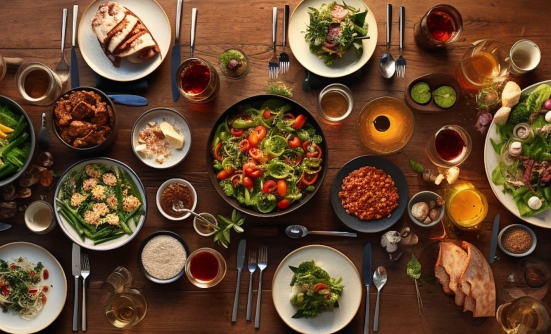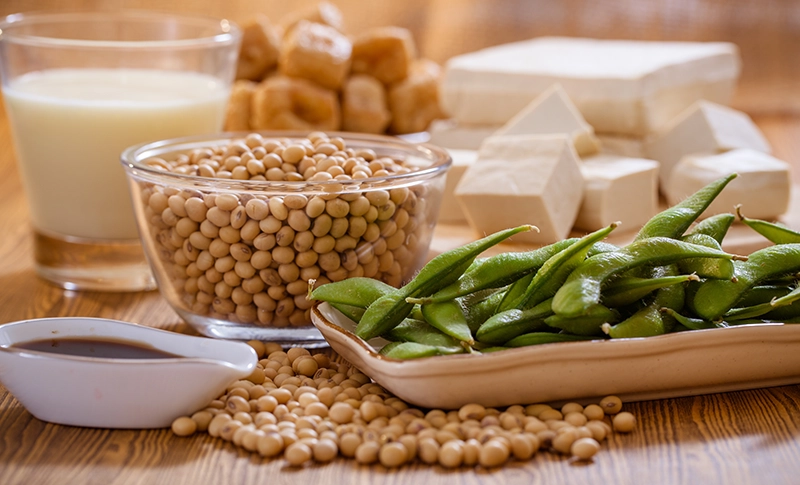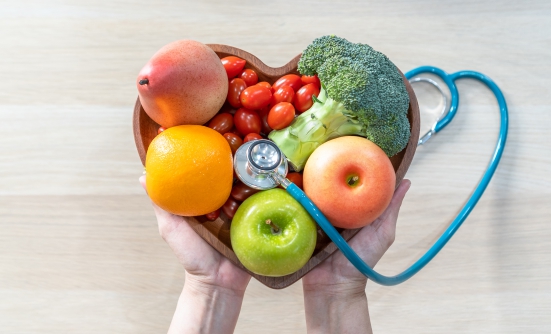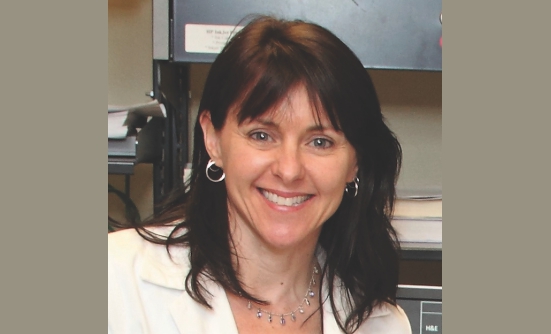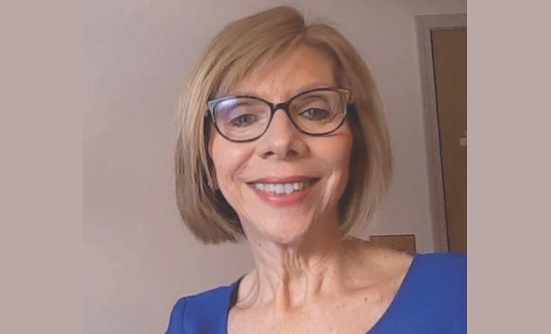Fatigue is a common complaint from people facing cancer. Tiredness can affect people during and after treatment. There are many possible causes for tiredness: cancer treatment, stress, diarrhea, dehydration, infection, or anemia. Unfortunately, there is not a simple solution to treat fatigue; instead, coping with fatigue may require a few different strategies.
There are several approaches that show promise in combating cancer-related fatigue. The most promising strategies are adequate rest, regular physical activity, counseling, and adequate nourishment.
Nutrition For Energy
It’s not necessary to follow a complicated diet to provide your body with energy. When it comes to your nutrition strategy, evidence suggests that plant-focused healthy eating patterns may be beneficial for combating fatigue. There are 5 key nutrients you should focus on: protein, complex carbohydrates, healthy fats, iron, and fluids.
Protein
Your body needs regular protein to repair and build muscle. My rule of thumb is 6 to 10 g of protein with snacks and 15 to 30 g with meals (see protein chart).
Complex Carbohydrates
These are essential sources of energy for your muscles and your brain, which is why low-carb diets are not recommended! Instead, by including fruits, whole grains, beans, milk, yogurt, and starchy vegetables (potatoes, corn, peas), you get nourishing carbs with fiber and many other nutrients. A good guide is to get 1 carbohydrate food at snack times and 2 carbohydrate foods at each meal. For example, a snack of an apple with peanut butter and a dinner that includes rice and beans.
Healthy Fats
Fat is an important source of energy, and a little bit goes a long way. The fats that most people need more of include monounsaturated fats and omega-3 fatty acids. Rather than getting these from pills, it is best to choose food sources, including fatty fish (salmon, tuna, mackerel, sardines), nuts, seeds, avocados, and olive oil.
Fluids
Dehydration, even at mild levels, can often leave you feeling low on energy. The good news is that the solution to dehydration is pretty easy! Be sure to drink plenty of fluids, preferably unsweetened. They can be hot or cold, just make sure you are drinking regularly throughout the day because it can take a day or 2 for your body to get back to balance after being dehydrated. Getting regular fluids throughout the day is a better strategy than loading up all at once. People who are receiving chemotherapy or other medication that may affect the kidneys might be asked to increase fluids even more than others.
Iron
Anemia (low iron) is another cause of fatigue that can be common in people going through cancer treatment or can be a result of certain types of cancer. If you are fatigued and things do not seem to be getting better, request that your doctor check your iron levels. You may need to ask that they check your iron stores. Sometimes your blood iron levels can be normal, but your stores can be depleted. The best solution to iron deficiency anemia is to take iron supplements for a period determined by your healthcare team. However, some people have such severe cases that they may require iron infusions or other medical therapy.
Healthy Snacks to Fight Fatigue
Almonds
Grapes
Trail mix
Applesauce cups
Popcorn
Banana
String cheese
Granola bars
Whole grain crackers
Sunflower seeds
Yogurt and granola
Graham crackers with almond butter
Hummus and veggies
Whole grain muffins
Rice cake and peanut butter
Hard-boiled egg
Apple and peanut butter
Eating Well With Fatigue
Choose high-protein and high-calorie foods so that when you eat, you are making the most of it. Foods that are nutrient-dense include peanut butter, avocado, nuts, and salmon. Eggs, Greek yogurt, and quinoa are all protein-dense foods.
I often emphasize the importance of having regular meal and snack times. If your body is short on energy, you are not doing yourself any favors by going a long time between nourishment. I have 3 simple tips to keep you nourished:
- Eat within an hour of waking and every 3 hours after that. Be sure that you respond to your hunger and fullness queues. Give your body nourishment when hungry, and pay attention to when you are full.
- Have snacks and easy meals ready to go. When you are fatigued, the last thing you want to do is cook a meal or prepare a snack. Have snack packs filled with nourishing foods easily available.
- Have your family and friends get snacks together and make or bring over meals. This will help you to get the nutrition you need to be energized and heal and prevent fatigue from preparing the food.
Final Thoughts
- Try to rest when you are the most tired
- When you are less tired, try to be active
- Keep a journal where you can record how often you become fatigued and how long it lasts
- Have snacks and meals ready to go so that you can get good nutrition without having to prepare food
- Choose foods high in complex carbohydrates, healthy fats, and protein so that when you do eat, you are getting good nutrition
- Be active! It is proven to help cancer-related fatigue.
Eat Well!
About the Author
Julie Lanford, MPH, RD, CSO, LDN, is a registered dietitian nutritionist, a board-certified specialist in oncology nutrition, and the Wellness Director of Cancer Services, Inc. in Winston-Salem, NC.




